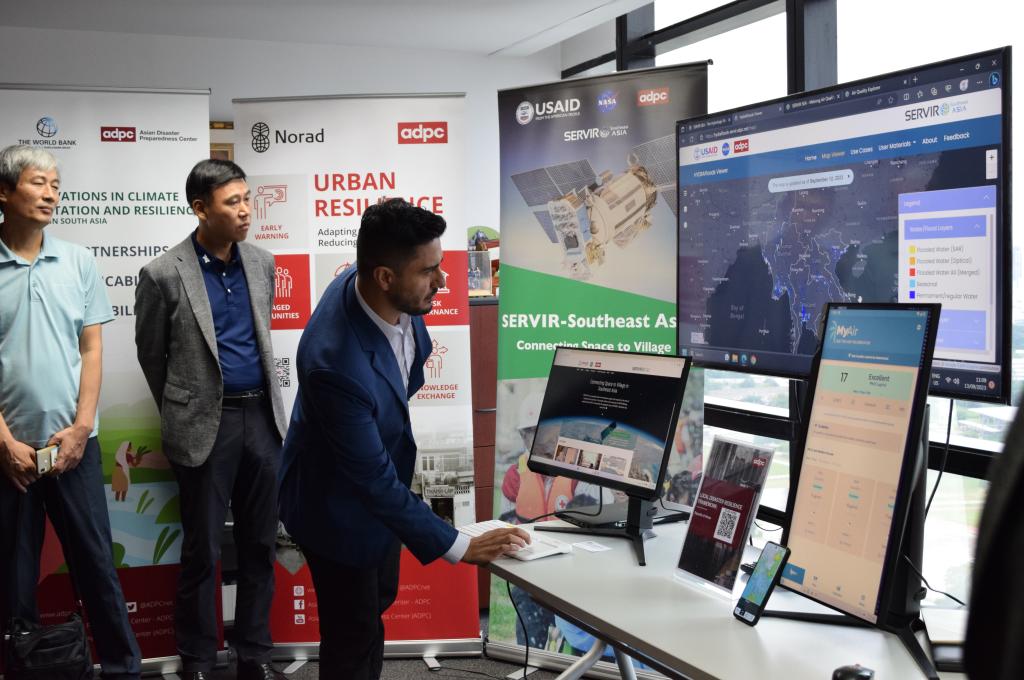ADPC SERVIR SEA Cements Relations with Korea to Enhance Regional Cooperation on Climate Change

In a further step towards establishing better regional cooperation on disaster preparedness and climate change issues in Southeast Asia (SEA), the Republic of Korea and the Asian Disaster Preparedness Center’s (ADPC) SERVIR SEA project have joined hands to address flood risks in the region.
The road for joint cooperation between SERVIR SEA and the Korean government was cleared after the U.S. Agency for International Development (USAID) and the Korea-Mekong Water Resource Management Center (KOMEC) signed a letter of intent in September for a multi-year cooperative agreement.
USAID, the U.S. National Aeronautics and Space Administration (NASA), and ADPC launched SERVIR SEA earlier in 2023 to help communities across Southeast Asia adapt to regional and transboundary climate issues and mitigate the impacts of climate change. SERVIR SEA receives open-data NASA satellite imagery and data and uses them to help seven countries in Southeast Asia develop and implement climate change and disaster risk reduction projects.
SERVIR SEA was also launched on the heels of years of successful programs by its parent organization ADPC, which has promoted cooperation in and implementation of disaster risk reduction and building climate resilience in Asia and the Pacific.
The planned SERVIR SEA work with the Korea-Mekong Water Resource Management Center (KOMEC) could pave the way for other SERVIR SEA projects in Korea, in line with the USAID Regional Development Mission in Asia’s (RDMA) 2020-2025 Regional Development Cooperation Strategy, and in line with Seoul’s potential to play a more pronounced political and financial role on regional climate issues.
The cooperation between SERVIR SEA and Korea is expected to be a three-year project, at a minimum, during which SERVIR SEA will tap into its regional flood forecasting know-how and propose a similar-but-local plan to the Korean government.
If accepted, the Korean government, with some financial commitment from USAID, will choose a Mekong River tributary, probably along the Lao PDR-Cambodia border region, and apply the same flood forecasting techniques to help local communities.
Choosing a transboundary tributary will be in line with the broader goals of the USAID, ADPC, SERVIR SEA, and the Korean government.
The RDMA Regional Development Cooperation Strategy not only puts a particular emphasis on the Lower Mekong subregion but it also puts a premium on improved regional partnerships and more sustainable development outcomes.
With three decades of track record in helping to provide safer communities and sustainable development through disaster risk reduction, such mixtures of regional-and-national projects show the ADPC’s continued commitment in Asia and the Pacific.
SERVIR SEA’s expanded relations with Korea is important in that it will provide “proof of concept” that regional disaster reduction solutions could be scaled down to individual national and local projects, whose collective positive results would still contribute towards improving conditions at the regional level. It could also open funding tools beyond SERVIR SEA’s relations with USAID.
The perceived flood forecasting cooperation would also benefit Korea in its desire to play a larger regional role, such as closer working relations with the Mekong River Commission, and making wider regional in-roads.
In September, the Korean government’s Ministry of Environment hosted the 2nd Korea-Mekong International Water Forum, which a ministry press release billed as “a large-scale international event” attended by Korea, five Mekong River countries of Cambodia, Lao PDR, Myanmar, Thailand, and Vietnam, as well as ADPC and USAID.
Korea also recently sent a high-level delegation to Philippines, Vietnam, and Thailand. In Bangkok, the Korean delegation met with the ADPC leadership and staff to be further briefed on disaster reduction and climate change projects.



